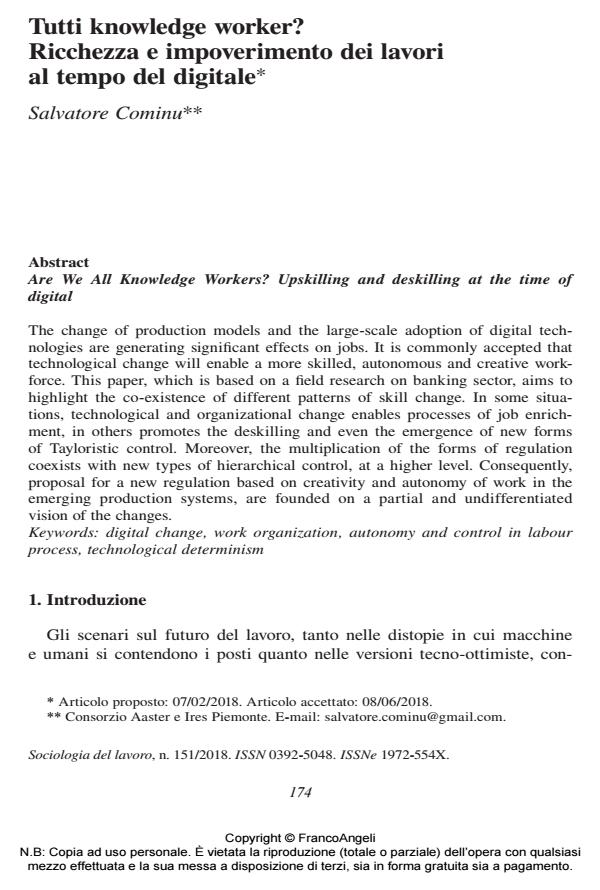Are We All Knowledge Workers? Upskilling and deskilling at the time of digital
Journal title SOCIOLOGIA DEL LAVORO
Author/s Salvatore Cominu
Publishing Year 2018 Issue 2018/151
Language Italian Pages 16 P. 174-189 File size 135 KB
DOI 10.3280/SL2018-151010
DOI is like a bar code for intellectual property: to have more infomation
click here
Below, you can see the article first page
If you want to buy this article in PDF format, you can do it, following the instructions to buy download credits

FrancoAngeli is member of Publishers International Linking Association, Inc (PILA), a not-for-profit association which run the CrossRef service enabling links to and from online scholarly content.
The change of production models and the large-scale adoption of digital technologies are generating significant effects on jobs. It is commonly accepted that technological change will enable a more skilled, autonomous and creative workforce. This paper, which is based on a field research on banking sector, aims to highlight the co-existence of different patterns of skill change. In some situations, technological and organizational change enables processes of job enrichment, in others promotes the deskilling and even the emergence of new forms of Tayloristic control. Moreover, the multiplication of the forms of regulation coexists with new types of hierarchical control, at a higher level. Consequently, proposal for a new regulation based on creativity and autonomy of work in the emerging production systems, are founded on a partial and undifferentiated vision of the changes.
Keywords: Keywords: digital change, work organization, autonomy and control in labour process, technological determinism
- The Cyber Economy Arsen S. Abdulkadyrov, Rasul M. Aliyev, Gasan B. Badavov, pp.163 (ISBN:978-3-030-31565-8)
- The Cyber Economy Anna V. Bodiako, pp.177 (ISBN:978-3-030-31565-8)
- The Cyber Economy Karine S. Khachaturyan, Arutun A. Khachaturyan, pp.127 (ISBN:978-3-030-31565-8)
- Tecnologia, organizzazione e lavoro nella quarta rivoluzione industriale: due studi di caso comparati nel settore manifatturiero Lino Codara, Francesca Sgobbi, in SOCIOLOGIA DEL LAVORO 157/2020 pp.225
DOI: 10.3280/SL2020-157012
Salvatore Cominu, Tutti knowledge worker? Ricchezza e impoverimento dei lavori in "SOCIOLOGIA DEL LAVORO " 151/2018, pp 174-189, DOI: 10.3280/SL2018-151010